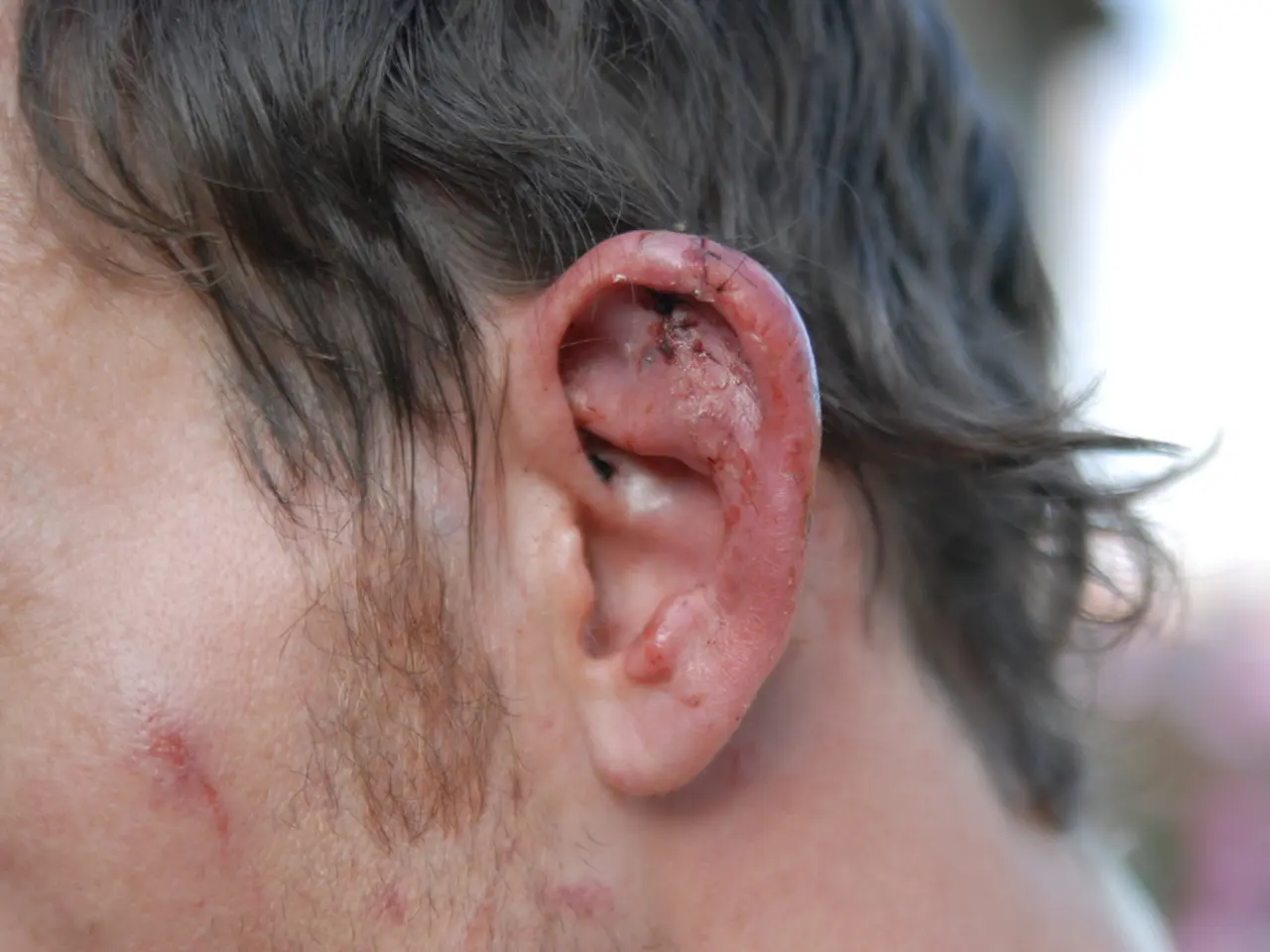Throat infection (oral thrush): Signs, remedies, and additional information.
## Antifungal Medications for Oral Thrush: Treatment Options for a Common Infection
Oral thrush, a common fungal infection, can present in various ways, from white or cream-colored deposits on the mucous membrane of the mouth in adults, to a white coating resembling cottage cheese in babies. In some cases, it may appear red raw rather than white, a condition known as erythematous oral thrush.
When dealing with oral thrush, several antifungal medications are available to treat the infection in adults. Here's a look at some of the commonly used medications, their dosages, and application methods.
1. **Nystatin Suspension** - This mouthwash is designed specifically for oral thrush. Adults are advised to swish 4-6 ml of the suspension in the mouth for several minutes, typically multiple times a day.
2. **Itraconazole Oral Solution** - For resistant cases of oral thrush, a dose of 200 mg per day is recommended. This oral solution is used for treating oropharyngeal or esophageal candidiasis (thrush), and is swallowed after being mixed with water.
3. **Posaconazole Oral Suspension** - Adults typically use 200 mg (5 mL) three times a day to treat oral thrush. It can be taken as an initial treatment or when other treatments have failed.
4. **Fluconazole** - While not mentioned in the search results, fluconazole is another commonly used antifungal for oral thrush. It is often prescribed in a single dose or short course depending on severity. Fluconazole can be taken by mouth or administered through a vein.
Each of these medications works by inhibiting fungal growth or killing the fungus. It's important to use these medications under the guidance of a healthcare professional to ensure appropriate therapy.
Other risk factors for oral thrush include heavy smoking, long-term use of steroid medication, inhaled corticosteroid medications for asthma, malnutrition, certain cancer treatments, and chemoradiation therapy for head and neck cancer. People with weakened immune systems, diabetes, or dry mouth (xerostomia) are also more likely to develop oral thrush.
In addition to antifungal medications, home remedies such as rinsing with salt water, using a soft toothbrush, and avoiding mouthwashes or sprays can help manage symptoms. It's also advised to wear dentures that fit well and are properly cleaned, and to use a spacer or rinse the mouth after using steroid inhalers to prevent oral thrush.
Remember, oral thrush is caused by fungi such as Candida albicans, Candida glabrata, Candida tropicalis, and Candida krusei. Antibiotic use can increase the risk of oral thrush by destroying bacteria that prevent these fungi from growing out of control.
For severe infections or thrush affecting the esophagus, doctors may prescribe fluconazole. Hyperplastic oral thrush, also known as "plaque-like candidiasis" or "nodular candidiasis", is characterized by a hard-to-remove, solid, white plaque. If a person scrapes the cream or white-colored deposits, bleeding may occur.
In infants under 1 month of age, the risk of developing oral thrush is higher. In these cases, it's important to consult a healthcare professional promptly.
In conclusion, oral thrush is a common fungal infection that can be treated with a variety of antifungal medications. By understanding the symptoms, risk factors, and treatment options, individuals can take steps to manage this condition effectively. Always consult a healthcare professional for accurate diagnosis and treatment.
[1] Nystatin Suspension for Oral Thrush. (2021). Drugs.com. Retrieved from https://www.drugs.com/npc/nystatin-suspension.html [2] Itraconazole Oral Solution for Oral Thrush. (2021). Drugs.com. Retrieved from https://www.drugs.com/npc/itraconazole-oral-solution.html [3] Posaconazole Oral Suspension for Oral Thrush. (2021). Drugs.com. Retrieved from https://www.drugs.com/npc/posaconazole-oral-suspension.html [4] Fluconazole for Oral Thrush. (2021). Drugs.com. Retrieved from https://www.drugs.com/npc/fluconazole.html [5] Itraconazole for Oral Thrush. (2021). Mayo Clinic. Retrieved from https://www.mayoclinic.org/diseases-conditions/oral-thrush/diagnosis-treatment/drc-20369594
- Oral thrush, a common fungal infection, can be a symptom of multiple medical-conditions such as obesity, diabetes, and psoriasis, which all weaken the immune system.
- In addition to antifungal treatments, science is exploring predictive therapies and treatments for conditions like Non-Small Cell Lung Cancer (NSCLC), Asthma, and Chronic Obstructive Pulmonary Disease (COPD), which often co-occur with oral thrush.
- People with oral thrush may also experience depression, a common health-and-wellness issue associated with various medical conditions.
- Hepatitis, an inflammation of the liver, can also increase the risk of developing oral thrush due to its impact on the immune system.
- Multiple sclerosis, a disease affecting the nervous system, can lead to dry mouth (xerostomia), creating an environment favorable for the growth of Candida, the fungus causing oral thrush.
- Understanding and managing oral thrush is crucial in the care of patients suffering from multiple medical-conditions, as the infection can exacerbate underlying health issues.
- In some cases, oral thrush may progress to severe forms, such as esophagitis, which can be a complication for people with diabetes or weakened immune systems.
- Proper oral care, including regular dental check-ups and good dental hygiene, can help prevent oral thrush in patients with medical-conditions like diabetes, asthma, or COPD.
- If left untreated, oral thrush can spread to other parts of the body and worsen existing medical-conditions, making it essential to seek medical care promptly.




